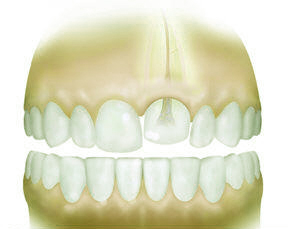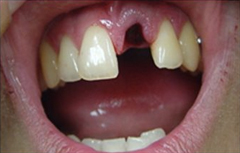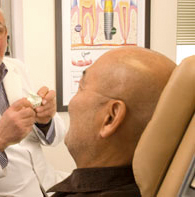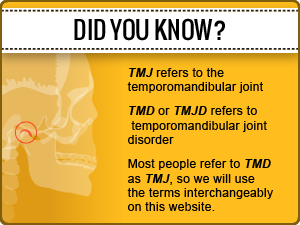Injury or Trauma
And the impacts on TMJInjury or trauma can cause TMJ
 It is a well-known fact that injury or trauma can cause TMJ, but how much do you know about the different types of traumas that affect the TMJ joints?
It is a well-known fact that injury or trauma can cause TMJ, but how much do you know about the different types of traumas that affect the TMJ joints?
Severe injuries, such as an obvious head trauma or fractured jaw, usually happen as the result of an accident or sport injury and are easily identified by a specific date and time. Any injury that has enough force to break or loosen teeth can permanently damage Temporomandibular joints, and associated tendons muscles or ligaments
There are other injuries, however, that are much more subtle. The deceptive natures of these types of injuries are generally more difficult to identify because the damage is not immediately apparent. If you have pain in your jaw joints and surrounding area, you may have TMJ disorder and not know how or when the injury occurred.
Do I have TMJ Disorder?
Symptoms include migraines, neck pain, jaw pain, lower back pain, snoring, sleep apnea. Use our Free TMJ Disorder Assessment ToolsMicro or macro?
TMJ can be caused by either a macrotrauma, microtrauma, or a combination of both.
A macrotrauma is defined as any type of major physical damage resulting from a single injury. Examples of a macrotrauma might include a direct blow to the jaw or whiplash resulting from the impact of an accident. Initial damage might include a dislocated jaw, head injury or neck trauma, but it is not unusual to see the onset of TMJ disorder after a car accident.
Some painful symptoms may last long after any fractures heal, including the following:
- Chronic headaches or migraines
- Ongoing jaw injury or pain in TM joints
- Aching or spasms in jaw and facial muscles
- Neck strain injury
- Painful grating, clicking or popping in TM joint when eating, chewing, yawning or making facial expressions
- Inability to find your bite or excessive awareness of your bite
- Dizziness
- Short-term memory loss
 A microtrauma is identified as minor, internal injury that is caused by repetitive behavior. These types of behaviors may include unconscious habits such as jaw clenching, teeth grinding or excessive gum chewing. Even the smallest muscle adaptation if repeated often enough can cause myofascial trigger points.
A microtrauma is identified as minor, internal injury that is caused by repetitive behavior. These types of behaviors may include unconscious habits such as jaw clenching, teeth grinding or excessive gum chewing. Even the smallest muscle adaptation if repeated often enough can cause myofascial trigger points.
The damage is done slowly and over a longer period of time. Unless the individual is aware of their behavior, they may not even know they are causing themselves any injury.
Symptoms may include the following:
- Chronic Headaches
- Ear pain or ringing in the ears
- Neck pain and strain
- Muscle spasms in the face or jaw
Effective treatment comes from accurate diagnosis
 The first step is to determine the root cause of your TMJ. To facilitate this, we conduct a full clinical examination using the advanced techniques of physiologic dentistry. Computerized jaw tracking, EMG and sonography are commonly utilized when appropriate. We carefully explain the findings of all your tests to you before we discusses our recommended plan of treatment. Diagnostic testing is thorough and may include the following:
The first step is to determine the root cause of your TMJ. To facilitate this, we conduct a full clinical examination using the advanced techniques of physiologic dentistry. Computerized jaw tracking, EMG and sonography are commonly utilized when appropriate. We carefully explain the findings of all your tests to you before we discusses our recommended plan of treatment. Diagnostic testing is thorough and may include the following:
- Full medical history
- Examination of jaw alignment and range of motion
- Skeletal structure examination
- Dental structure examination
- Neurological examination
- Other special diagnostic tests of the airway, muscles or ligaments, as recommended
Learn more
Is an injury to your jaw causing your TMJ pain? If you would like to learn more about TMJ, we have an informative e-book about TMJ you may download today. It is full of helpful information about TMJ and it is absolutely free.
If you have an injury in your medical history and think you might have TMJ disorder resulting from that injury, contact our office for a full evaluation.


0 Comments